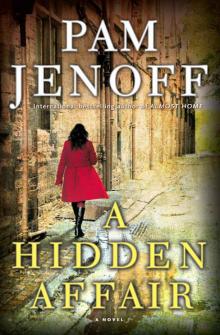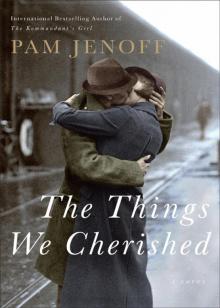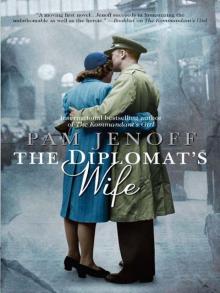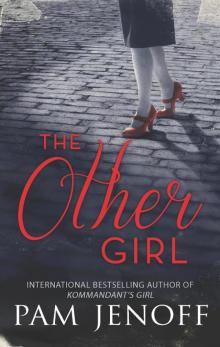- Home
- Pam Jenoff
A Hidden Affair Page 2
A Hidden Affair Read online
Page 2
Watching her, my pulse quickens slightly. Easy, I think. Though the woman stands out among the elderly residents, there is no reason to assume that she is connected to Jared. But something, instinct or my training or perhaps some combination of the two, makes me think she could be a neighbor, someone who has seen him.
When the door closes behind the woman, I turn away, studying the man at the nearby table once more out of the corner of my eye. He continues to focus on the newspaper in front of him. But even from this distance, I can tell from the bold print of the advertisements that it is still open to the same page as before, despite the fact that several minutes have passed. Something is not right. What is he doing here, sitting alone in the middle of the day? Is he following me? Though Mo promised she would leave me to my hunt for Jared in peace, there are others she cannot control who might try to stop me.
I force myself to breathe normally, fighting the urge to stand up and leave. Paranoia has never served me well. There could be lots of reasons why the man is sitting here. Still, this will be my last visit to the café. Varying one’s schedule and route is a basic counterintelligence rule; repetition is the easiest way to get caught. And I cannot keep returning here day after day, just waiting. If Jared isn’t here and the trail has gone cold, I need to know so that I can decide what to do next. I have to figure out if Jared is still connected to this address.
I think once again of the blond woman, who has disappeared into the apartment building. Should I try to speak with her to see if she knows Jared? It’s a long shot but seems as good a way as any, and better than sitting here indefinitely.
I put some coins on the table, then stand and walk from the café. As I cross in front of the man with the newspaper, I feel his eyes on me. My stomach twitches. Easy, I think. He could just be, as the kids say nowadays, checking me out. Men in the Mediterranean tend to be much more unabashed in their admiration of women, I remind myself, remembering the catcalls on the streets during my student travels through Italy and Spain that intimidated me so. But I will not approach the apartment building directly, just to be safe. I go to the corner and make a left. As I turn, I glance over my shoulder at the man, who seems engrossed in his newspaper once more.
At the next intersection I turn left again, continuing around the block. The sun has climbed higher in the sky now, the late morning May air as hot as a midsummer afternoon in Washington. I pick up my pace, completing the circle. When I reach the corner by the apartment building, I stop, scanning the café across the street.
The man with the newspaper is gone.
My suspicion rises once more. If he was watching me, he would have had no further business at the café once I left. I search the street for the man but don’t see him. Perhaps he just finished his drink and went on his way. In any event, I cannot worry about him now. I need to speak with the blond woman.
Taking a final look in all directions, I start toward the iron gate of the apartment building and slip into the front garden. I try to walk normally down the path, to appear as though I belong there to anyone who might be watching. I reach the door and turn the handle, but it is locked.
Hesitating, I study the dozen or so buttons beside the door. Each is labeled with a surname. None, of course, is Jared’s, and I cannot tell which might belong to the woman. For a minute I consider pressing all of them, but that would attract too much attention. And what would I say, that I am looking for a man who might have been here once, for anyone who might know him?
There is a scuffling sound on the other side of the door and I step back quickly as it opens, moving to one side to let an elderly man exit. His eyes flick in my direction. “Bonjour,” I say, managing a smile, hoping to disarm any suspicions. A look of confusion crosses his face and I instantly regret not remaining quiet, fearful that my abysmal French accent will only make more obvious the fact that I do not belong. But foreigners are more the rule than the exception here, and the man nods, then shuffles down the walkway.
I move swiftly toward the door of the building, grabbing it before it closes. Inside, the lobby is simple and elegant, with a black-and-white tiled floor, a marble staircase curving upward. A large bowl of gardenias sits on the table in the center of the foyer, their perfumed aroma trying unsuccessfully to mask the musty older-building smell.
I peer up the staircase uncertainly. Despite my earlier hesitation, I have no choice, it seems, but to simply begin knocking on apartment doors. But where to begin? The top floor, I decide, picturing the elderly residents I’ve watched come and go these past two days. Perhaps since the building has no elevator, they are more likely to occupy the lower levels, leaving the upper floors to younger residents like the blond woman.
I start up the stairs, my heels echoing loudly. Each level has two separate apartments, I notice as I pass the second floor, then the third. But when I reach the fourth-floor landing, the apartment door farther down the hallway is open, painters working on ladders, readying an empty space for new residents. Only the near apartment appears to be occupied.
I pause before the mahogany door. I do not know if the woman lives here, or what I will say to her if she answers. But I have to try something. I raise my hand, lightly tap the brass knocker twice.
“Oui?” a young female voice calls. The door opens and the blond woman appears before me. I inhale sharply. So it is her apartment after all.
A look, surprise or confusion, maybe, flashes across her face before disappearing again. “Bonjour . . . ”
I hesitate, wondering if I should try to speak French, then decide against it. “Hello . . . ” I am suddenly at a loss for words. Behind the woman, the apartment is large, a sprawling open room with smooth wood floors, trim, modern furniture giving it an even more expansive feel. The far wall is lined with glass doors opening up to a balcony, framing a distant view of the sea. Jealousy washes over me as I imagine Jared here, sipping drinks on the balcony, laughing with this woman beneath the sparkling sun.
“May I help you?” the woman asks in accented English, now with an edge to her voice.
I study the scalloped edge of her crisp white blouse, trying to think of an alibi for my presence, a way to ease into the questions I need to ask. Finding none, I decide to be direct. “I’m looking for a man called Jared Short.”
“I’m not familiar with him,” she says, a second too quickly.
“Or maybe he isn’t going by that name. Michael Laurent? Joseph McVey?” I ask, reciting the aliases I’d memorized from the file Mo gave me. I reach into my bag and pull a photo of Jared, taken on a crowded street sometime in the years since his disappearance, from the file.
She opens her mouth, eyes darting from the photograph to the ceiling, then back again. “I told you, I don’t know him,” she replies, her voice wavering.
I take a deep breath. “I know that Jared was here.” The bluff is a calculated risk.
“You’re wrong,” she says forcefully, regaining her footing. Her terseness is more than mere annoyance, I decide instantly. She is nervous, perhaps hiding something. “This is my grandmother’s apartment. I came here alone on holiday.” For a second I almost believe her. But the décor does not bespeak an older person’s home. “Now I really must ask you to leave.”
I look down, contemplating my next move. Jared apparently isn’t here and I can’t force her to admit he has been. “Okay, but please tell Jared that I am looking for him.” She starts to reply, but before she can deny knowing him again I raise my hand. “It’s vitally important that I find him.” I reach into my bag once more and hastily pull out the cell phone I purchased shortly after my arrival yesterday, then scribble the phone number on the back of an old receipt. “Ask him to call me,” I say, handing the paper to her. “My name is Jordan Weiss.”
She does not respond, but takes the paper from me and starts to close the door. Before she can disappear, I catch her gaze again.
This time, the look of fear in her eyes is unmistakable.
chapter TWO
&nb
sp; I STRETCH ACROSS THE wide bed, watching the blades of the ceiling fan rotate slowly. The hotel, a few blocks west of the one I left this morning, is considerably less opulent, yet still comfortable in a relaxed sort of way. The smaller, sun-drenched room is modern and minimalist, with a cubed desk and beige chaise lounge. A fresh orchid sits in a lead crystal vase on the nightstand.
I run my hand along the smooth white duvet, picturing the blond woman as she stood in the doorway to the apartment. Who is she anyway, and what is her connection to Jared? From the time Mo told me Jared is alive, I have consciously avoided thinking about how he spent the years after we parted. Now jealousy rises in me unabated. Is she a girlfriend or lover? She could be just a friend—a very attractive friend. But the fear I saw in her eyes tells me there is something more. She wouldn’t risk what it takes to protect Jared without a reason.
Of course, I don’t know why a person does anything anymore. The illusion of logical motive was shattered for me a few nights ago when I crept into Mo’s office at the embassy and learned the truth about Jared’s death, the full extent of the conspiracy to bring me to England. I had already found out through those last desperate days of investigation about the doctoral research that had put Jared’s life in jeopardy. But only when confronted with proof of her involvement did Mo tell me everything: Jared had not drowned in the river that night a decade earlier but had faked his own death, disappearing steps ahead of the powerful forces determined to silence him. Fortunately their plan did not work; I found the information Jared had hidden and was able to turn it over to the authorities. And Jared himself is still out there somewhere, alive. At least that is my hope.
Mo, I think again, propping up my chin in my hands. A breeze blows in from the open patio door, rustling the sheer linen curtains, sending the wind chimes above jangling. How is it possible that one of my closest friends (one of my few friends, in point of fact) had lied to me and nearly gotten me killed? Not that hers was the only betrayal: Sebastian, the first man in a decade I could have really loved, proved to be a traitor, too.
Sarah’s face pops into my mind. One person, at least, who I know with virtual certainty would never betray me. I cringe, picturing her lying in the hospital bed, pale and weak. She’s had a hard enough time of it, fighting the disease that is ravaging her body with slow, calculated determination. But then she tried to help me find out the truth about Jared’s supposed death, and it nearly got her killed.
She’s home from the hospital now, thankfully. But I need to call her, see how she’s doing. I roll over and grab my bag from the nightstand, pulling out the cell phone. I almost didn’t buy it. The store did not have the prepaid type; it required a credit card, which would make me easier to track if anyone is looking for me. But I couldn’t keep going indefinitely without one—Sarah, and my parents at least, need to be able to reach me. So I purchased the phone, swallowing my natural inclination to buy the cheapest model and splurging for a BlackBerry that gives me access to my email as well.
I dial Sarah’s number from memory, tap the receiver as it rings a second time, then a third.
“Hallo,” a male voice answers.
For a second I consider hanging up; Sarah’s boyfriend, Ryan Giles, is a British police officer. Will he report my call if someone is looking for me? “Hello, Ryan,” I say, deciding to take the chance. “It’s Jordan Weiss.”
“Jordan, how are you?” Hearing his concerned, affable tone, I am flooded with relief. He isn’t going to turn me in. Of course not. His first loyalty is to Sarah, has been since the moment they met in the hospital a few weeks ago.
“I’m well. Is Sarah there?” I glance at the clock, remembering the afternoon nap that sometimes helps reinvigorate her. “I don’t want to wake her if she’s sleeping.”
“Not at all. One moment.”
There is a shuffling sound as the phone is passed and Sarah’s crisp, South African accent crackles over the line. “Jordie, are you all right?”
“Absolutely fine,” I reply quickly, wanting to erase the worry from her voice. I fight the urge to tell her where I am, for her protection as well as mine.
“Have you . . . ?”
Though she doesn’t finish her question, I know she is asking if I’ve found Jared. “Not yet.”
There is silence on the other end. Sarah has always been the friend who would never judge me, the picture of unconditional support. I could call her in the middle of the night and tell her I wanted to rappel down the side of the Empire State Building and she would respond by asking what time should she be there, how much rope should she bring. But I can tell that she’s worried: she thinks my quest to find Jared, hopping on a plane with nothing more than a scrap of information is crazy, and she is concerned about me getting my hopes up for what could be a fruitless search.
“I had Ryan check on Chris for you,” she says at last, changing the subject.
Guilt rises in me as I picture Jared’s best friend, captain of our close-knit college rowing team. Chris was the one who had brought the mystery of Jared’s death to me in the first place, insisting that Jared’s drowning in the river did not make sense. And he was right. But as we searched for the truth behind who killed Jared, I grew distrustful of Chris’s motives. The fact that we slept together in the middle of our search didn’t help. I avoided him after that night, my suspicion fueled by false clues fed to me by Sebastian. In the end, I almost killed Chris, shooting him before learning that Sebastian had set him up. Fortunately, the wound hadn’t been fatal. “How is he?”
“He’s getting much stronger. Should be out of the hospital in a few days. He’s been offered a chance to do a freelance piece by the Times on what happened to him. Just the shooting and recovery experience,” she adds quickly. “Not the underlying investigation stuff.”
“That’s amazing.” Chris had been a world-class journalist until his career and marriage were derailed by the ghosts that dogged us both. “He deserves a fresh start.”
“We all do,” Sarah replies pointedly. I do not answer. I know that she wishes I would give up my search for Jared and move on with my life. “Anyway, Ryan told Chris you’d been called away for work.”
“Thanks,” I reply. I hate that others have to lie for me, but I cannot share what I learned about Jared until I find him and see for myself. Then I’ll be able to call Chris, tell him the truth, and put those ghosts to rest for both of us once and for all. “More important, how are you?” I ask.
“Really well,” Sarah says, her voice brightening to the point where I almost believe her. “Maureen contacted me about the clinic in Geneva, told me that the arrangements and payment had already been made.” She pauses and I hold my breath, praying that Sarah will not fight me on going for what might be her best and only chance against the disease. “Jordan, you didn’t have to . . . ” Her voice cracks. “I mean, in the middle of everything else you’ve been dealing with, to do this for me . . . ”
“It was nothing,” I say. Getting Mo to secure and fund Sarah’s trip to the clinic had been part of the bargain, another concession I extracted in exchange for my silence. “So you’re going?”
“Yes. Ryan’s been able to get leave from work. We’re leaving tomorrow.”
I exhale quietly. “That’s great news.”
“Thanks to you.” Her voice is full and sincere.
“Sar, can you do me a favor?”
“Of course,” she replies quickly. “Anything.”
“Call my parents. Tell them I’ve been sent somewhere else and that I’m fine. Don’t tell them I’ve left State, though, okay? I’ll call them myself as soon as I can.”
“No worries; I’ll do that right now. Promise me you’ll be careful?”
“I will.” I can tell that she is thinking of the thugs that were chasing me in England, the danger we both faced. “Talk soon, okay?”
“Love you,” she says, hanging up before I can respond.
I hold the phone in my hand for several seconds, imagining Sarah curl
ed up in her flat with Ryan. Only days before she met him, she seemed so certain of never finding anyone, resolved to spend whatever time she had left alone. And then in the hospital she met a man who seemed to love her instantly and without hesitation, despite the challenges her condition brings. They never would have found each other without the attack that hospitalized her, the investigation that brought me to England under false pretenses.
Despite my tremendous happiness for her, I cannot help but feel a slight tug of jealousy. She, at least, is not alone whereas I . . . sadness washes over me, catching me off guard. What’s wrong with me? I’ve spent the past decade on my own, except for an occasional fling, and it’s never bothered me before. Is it my recent brush with Sebastian, the way I nearly opened up and allowed myself to like him? No, it’s something more than that—the realization that Jared is alive, the possibility of seeing him again, has stirred emotions in me that I’d long forgotten: desire, hope. And those feelings are more terrifying than anything I can remember.
But alongside my excitement at the prospect of seeing Jared again, negative thoughts intrude. The fact that Jared is alive means that the past ten years of my life, every thought I had and decision I made, was predicated upon a flawed assumption. An image flashes through my mind, quick and unbidden: the bright lights of a doctor’s office, a metal table icy cold beneath my thin gown. I hold up my hand as if to shield my eyes from the vision, banished from my conscious mind for years. Stop. I push the memory away. I cannot do this. Not now.
I put the cell phone back in my bag. Sarah’s skepticism at my quest echoes back at me. What am I doing here? I hopped on a plane at a moment’s notice, driven by impulse and an address where someone claimed to have seen Jared once in the near past. Hardly the solid lead or thorough investigating my training as a State Department intelligence officer had taught me to rely upon.

 The Orphan's Tale
The Orphan's Tale The Lost Girls of Paris
The Lost Girls of Paris A Hidden Affair: A Novel
A Hidden Affair: A Novel The Last Embrace
The Last Embrace Almost Home: A Novel
Almost Home: A Novel A Hidden Affair
A Hidden Affair Almost Home
Almost Home The Winter Guest
The Winter Guest The Last Summer at Chelsea Beach
The Last Summer at Chelsea Beach The Ambassador's Daughter
The Ambassador's Daughter The Things We Cherished
The Things We Cherished The Diplomat's Wife
The Diplomat's Wife The Kommandant's Girl
The Kommandant's Girl The Other Girl
The Other Girl